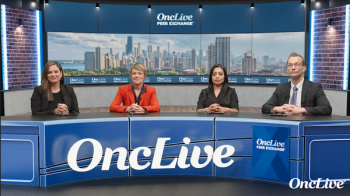Articles by Wade T. Iams, MD

Panelists discuss how emerging targeted and biomarker-directed therapies are poised to transform the treatment landscape for both limited-stage and extensive-stage small cell lung cancer, highlighting the potential for improved patient outcomes through personalized approaches.

Panelists discuss how preliminary results from the pPhase 3 ARTEMIS-001 study indicate that iIfinatamab dDeruxtecan, a B7-H3 antibody-drug conjugate, demonstrates promising antitumor activity in relapsed small cell lung cancer, with a notable partial response rate and manageable safety profile among treated patients.

Panelists discuss how the overexpression of B7-H3 plays a crucial prognostic role in small cell lung cancer, exploring the mechanisms by which ifinatamab deruxtecan targets this protein to overcome treatment resistance and enhance tumor selectivity, while also considering the potential for durable responses and the use of patient-derived xenograft models to advance drug development and assess B7-H3 expression.

Panelists discuss how the treatment schedule of ifinatamab deruxtecan at 12 mg/kg intravenouslyIV Q3W once every 3 weeks may compare favorably to established regimens like amrubicin, topotecan, and lurbinectedin for relapsed small cell lung cancer, while also exploring potential dose adjustments, immunogenicity concerns, and the synergistic effects when combined with atezolizumab and carboplatin.

Panelists discuss how tarlatamab could serve as a promising combination therapy for previously treated small cell lung cancer, highlighting its potential clinical benefits when paired with durvalumab as maintenance therapy after standard regimens, and emphasizing the importance of statistically significant trial end points to encourage its adoption in community oncology practices.

Panelists discuss how the risks and clinical benefits of tarlatamab in relapsed or refractory extensive-stage small cell lung cancer must be carefully evaluated, considering the implications of bBlack bBox warnings for cytokine release syndrome and immune effector cell–-associated neurotoxicity syndrome, as well as the challenges of managing outpatient therapy for patients distant from treatment facilities, while also exploring the potential for reduced monitoring time between infusions given the safety profile observed in clinical studies.

Panelists discuss how the DeLLphi-301 clinical trial demonstrates an objective response rate of 32% to 40% with tarlatamab, which is clinically meaningful given the rapid onset of responses observed between 5 and 7 weeks, while also considering the implications of a median overall survival of 14 months and the duration of response exceeding 6six months for relapsed or refractory extensive-stage small cell lung cancer.

Panelists discuss how the definition of platinum sensitivity in extensive-stage small cell lung cancer may still rely on the 90-day criterion, while also exploring other factors contributing to treatment resistance, alongside an examination of tarlatamab’'s unique mechanism as a bispecific T-cell engager and its potential as a subsequent therapy after platinum-based chemotherapy.

Panelists discuss how the timing of consolidation therapy with a PD-L1 inhibitor after completion of chemoradiotherapy in limited-stage SCLC small cell lung cancer can vary from immediately to 6six weeks, while also exploring the potential for curative-intent immunotherapy with durvalumab, the role of SBRT cCRT concurrent chemoradiotherapy followed by durvalumab, and insights from the ADRIATIC clinical trial regarding the use of PCI in this patient population.

Panelists discuss how the interim results from the phase 3 ADRIATIC trial demonstrate significant overall survival and progression-free survival benefits for patients with limited-stage small cell lung cancer following concurrent chemoradiotherapy, highlighting the potential clinical relevance of durvalumab in improving life expectancy and its mechanisms of synergy within the tumor microenvironment.

Panelists discuss how the surgical approach to limited-stage small cell lung cancer varies, including the percentage of cases amenable to resection, the preference for lobectomy in stage I-IIA disease, and the role of mediastinal lymph node staging in shaping treatment strategies, alongside considerations for choosing between surgery and radiotherapy, the selection of systemic treatments, and the integration of prophylactic cranial irradiation in treatment plans.

Panelists discuss how the current landscape of first-line treatment for limited-stage small cell lung cancer is shaped by various clinical factors that influence the diagnostic workup and management, emphasizing the importance of a multidisciplinary team approach in developing effective treatment plans for these patients.

Wade T. Iams, MD, discusses the potential for providing small cell lung cancer subtyping in clinical practice.

Wade T. Iams, MD, discusses the evaluation of sotorasib in KRAS G12C–mutant solid tumors, including non–small cell lung cancer.

Wade T. Iams, MD, discusses the need to establish the clinical utility of circulating tumor DNA testing in lung cancer.

Wade T. Iams, MD, discusses the emergence of TKIs and antibody-drug conjugates in HER2-mutant lung cancer.

Wade T. Iams, MD, and Erin A. Gillaspie, MD, MPH, discuss the impact that immunotherapy has had on the treatment of patients with early-stage non–small cell lung cancer.









